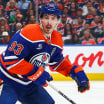The table is set for a Stanley Cup Final rematch, the defending-champion Florida Panthers set to meet the Edmonton Oilers in the first such winner-take-all return engagement since 2009.
The Panthers hope to make it two straight against the Oilers, whom they defeated in seven games last season to win their historic first NHL title. Game 1 is Wednesday in Edmonton (8 p.m.; TNT, truTV, MAX, CBC, SN, TVAS).
It was a heartbreaking 2-1 Game 7 loss for Edmonton last June 24, the Oilers just the third team in NHL history to force a Game 7 after facing a 3-0 series deficit during the Final and 10th to do so in a postseason round.
This will be the 11th time in League history that teams will meet for a second consecutive season to decide the champion; with an asterisk, the 12th, considering that the Montreal Canadiens played the Detroit Red Wings in the Final of the Original Six era in 1954 and 1955, with another rematch then in 1956.
Defending champions are 7-4 in previous Stanley Cup Final rematches, including the Red Wings winning and losing during the three-year stretch from 1954-56. However, the runner-up has won each of the two rematches since the League’s 16-team playoff format was introduced.

































